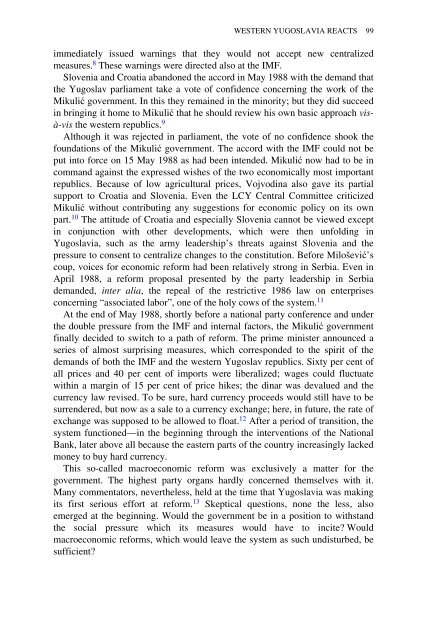Yugoslavia: A History of its Demise - Indymedia
Yugoslavia: A History of its Demise - Indymedia
Yugoslavia: A History of its Demise - Indymedia
Create successful ePaper yourself
Turn your PDF publications into a flip-book with our unique Google optimized e-Paper software.
WESTERN YUGOSLAVIA REACTS 99<br />
immediately issued warnings that they would not accept new centralized<br />
measures. 8 These warnings were directed also at the IMF.<br />
Slovenia and Croatia abandoned the accord in May 1988 with the demand that<br />
the Yugoslav parliament take a vote <strong>of</strong> confidence concerning the work <strong>of</strong> the<br />
Mikulić government. In this they remained in the minority; but they did succeed<br />
in bringing it home to Mikulić that he should review his own basic approach visà-vis<br />
the western republics. 9<br />
Although it was rejected in parliament, the vote <strong>of</strong> no confidence shook the<br />
foundations <strong>of</strong> the Mikulić government. The accord with the IMF could not be<br />
put into force on 15 May 1988 as had been intended. Mikulić now had to be in<br />
command against the expressed wishes <strong>of</strong> the two economically most important<br />
republics. Because <strong>of</strong> low agricultural prices, Vojvodina also gave <strong>its</strong> partial<br />
support to Croatia and Slovenia. Even the LCY Central Committee criticized<br />
Mikulić without contributing any suggestions for economic policy on <strong>its</strong> own<br />
part. 10 The attitude <strong>of</strong> Croatia and especially Slovenia cannot be viewed except<br />
in conjunction with other developments, which were then unfolding in<br />
<strong>Yugoslavia</strong>, such as the army leadership’s threats against Slovenia and the<br />
pressure to consent to centralize changes to the constitution. Before Milošević’s<br />
coup, voices for economic reform had been relatively strong in Serbia. Even in<br />
April 1988, a reform proposal presented by the party leadership in Serbia<br />
demanded, inter alia, the repeal <strong>of</strong> the restrictive 1986 law on enterprises<br />
concerning “associated labor”, one <strong>of</strong> the holy cows <strong>of</strong> the system. 11<br />
At the end <strong>of</strong> May 1988, shortly before a national party conference and under<br />
the double pressure from the IMF and internal factors, the Mikulić government<br />
finally decided to switch to a path <strong>of</strong> reform. The prime minister announced a<br />
series <strong>of</strong> almost surprising measures, which corresponded to the spirit <strong>of</strong> the<br />
demands <strong>of</strong> both the IMF and the western Yugoslav republics. Sixty per cent <strong>of</strong><br />
all prices and 40 per cent <strong>of</strong> imports were liberalized; wages could fluctuate<br />
within a margin <strong>of</strong> 15 per cent <strong>of</strong> price hikes; the dinar was devalued and the<br />
currency law revised. To be sure, hard currency proceeds would still have to be<br />
surrendered, but now as a sale to a currency exchange; here, in future, the rate <strong>of</strong><br />
exchange was supposed to be allowed to float. 12 After a period <strong>of</strong> transition, the<br />
system functioned—in the beginning through the interventions <strong>of</strong> the National<br />
Bank, later above all because the eastern parts <strong>of</strong> the country increasingly lacked<br />
money to buy hard currency.<br />
This so-called macroeconomic reform was exclusively a matter for the<br />
government. The highest party organs hardly concerned themselves with it.<br />
Many commentators, nevertheless, held at the time that <strong>Yugoslavia</strong> was making<br />
<strong>its</strong> first serious effort at reform. 13 Skeptical questions, none the less, also<br />
emerged at the beginning. Would the government be in a position to withstand<br />
the social pressure which <strong>its</strong> measures would have to incite Would<br />
macroeconomic reforms, which would leave the system as such undisturbed, be<br />
sufficient
















